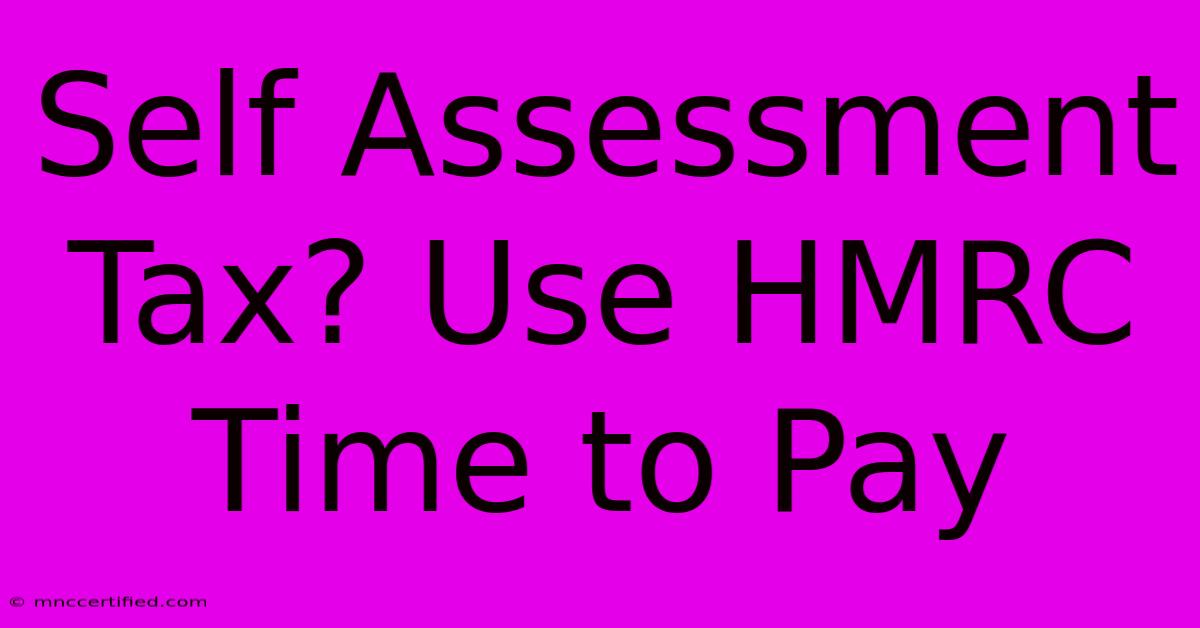Self Assessment Tax? Use HMRC Time To Pay

Table of Contents
Self Assessment Tax: Understanding Your Options with HMRC Time to Pay
Self Assessment tax returns can be daunting, especially when faced with a large tax bill you're struggling to pay. Understanding your options, particularly HMRC's Time to Pay arrangement, is crucial to avoid penalties and maintain a positive relationship with the tax authority. This comprehensive guide will break down Self Assessment, explore potential payment difficulties, and detail how to navigate the HMRC Time to Pay process.
What is Self Assessment Tax?
Self Assessment is the UK tax system requiring millions of individuals and businesses to declare their income and capital gains annually. It applies to various income sources, including:
- Employment income: If you earn above a certain threshold or have multiple employers.
- Self-employment income: Freelancers, contractors, and the self-employed must declare their profits.
- Rental income: Income from property rentals is taxable under Self Assessment.
- Investment income: Dividends, interest, and capital gains from investments need to be reported.
Failing to file your Self Assessment return by the deadline (typically 31 January) or paying the tax owed can result in significant penalties. Therefore, accurate record-keeping and timely submission are essential.
Facing Payment Difficulties? Understanding Your Options
Many taxpayers face unexpected financial challenges that make meeting their Self Assessment tax liabilities difficult. Before resorting to drastic measures, explore these options:
- Budgeting and Prioritization: Carefully review your finances to identify areas where you can cut back and prioritize your tax payment.
- Seeking Financial Advice: A financial advisor can offer personalized guidance on managing your debt and creating a realistic repayment plan.
- Negotiating with Creditors: Contact your creditors to discuss potential payment arrangements, such as reduced payments or extended deadlines.
HMRC Time to Pay: Your Lifeline for Self Assessment Debt
HMRC's Time to Pay (TTP) arrangement offers a lifeline to taxpayers facing temporary financial hardship. It allows you to spread your tax bill over a manageable period, usually via installments. However, it's crucial to remember that:
- It's not a debt forgiveness scheme: You still owe the full amount; TTP simply provides a payment plan.
- Interest will still accrue: You'll continue to pay interest on your outstanding tax debt.
- Eligibility isn't guaranteed: HMRC will assess your circumstances to determine your eligibility.
How to Apply for HMRC Time to Pay
Applying for HMRC Time to Pay is typically done through their online services or by contacting them directly via phone. You'll need to provide information regarding:
- Your tax liability: The total amount you owe.
- Your financial situation: Income, expenses, assets, and liabilities.
- Proposed repayment plan: A realistic and manageable payment schedule.
Be prepared to provide evidence to support your claims. HMRC may request bank statements, payslips, or other financial documentation.
Factors Affecting HMRC Time to Pay Approval
HMRC considers several factors when assessing your TTP application, including:
- The amount of tax owed: Larger debts may require more stringent repayment plans.
- Your repayment history: A history of timely payments increases your chances of approval.
- Your current financial situation: Evidence of genuine financial hardship strengthens your application.
- Your ability to repay: A realistic and sustainable repayment plan is essential.
Avoiding Penalties and Maintaining a Good Standing with HMRC
Proactive communication with HMRC is key. If you foresee difficulties in meeting your tax obligations, contact them before the deadline. This demonstrates your willingness to cooperate and increases your chances of a favorable outcome. Ignoring the issue will only worsen the situation, leading to increased penalties and potential legal action. Remember, responsible tax planning and timely action are crucial for maintaining a good standing with HMRC.
Keywords for SEO Optimization
This article incorporates the following keywords and variations to improve search engine optimization:
- Self Assessment Tax
- HMRC Time to Pay
- Tax Payment Difficulties
- Self Assessment Deadline
- Tax Debt
- HMRC Payment Plan
- Self Employed Tax
- Rental Income Tax
- Capital Gains Tax
- Income Tax
- Tax Return
By strategically using these keywords throughout the article naturally and providing valuable information, this post aims for high search engine rankings. Remember to also build backlinks from reputable websites to further improve off-page SEO.

Thank you for visiting our website wich cover about Self Assessment Tax? Use HMRC Time To Pay. We hope the information provided has been useful to you. Feel free to contact us if you have any questions or need further assistance. See you next time and dont miss to bookmark.
Featured Posts
-
Mayweather Addresses Fan Confrontation
Dec 12, 2024
-
Guilty Verdict In Sara Sharif Murder Case
Dec 12, 2024
-
Free Lottery Musical Tickets
Dec 12, 2024
-
Indias Edible Oil Imports Surge
Dec 12, 2024
-
Facebook Instagram Down User Reports
Dec 12, 2024